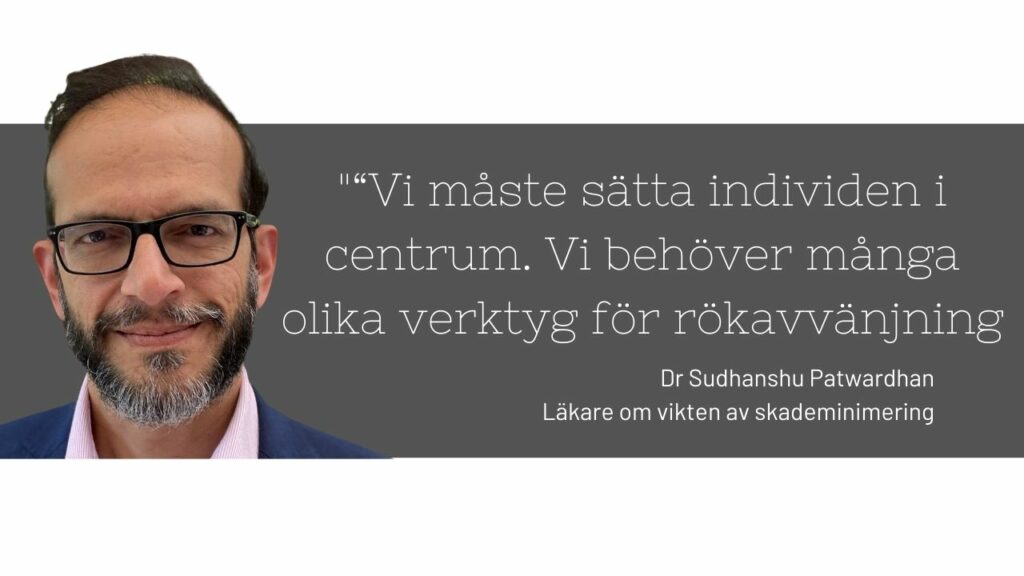Doctors lack basic knowledge about nicotine and smoking cessation, with serious consequences for smokers. This is according to a new report from the UK.
"A common theme is that doctors around the world believe that nicotine causes cancer, and that few have a clue how to use nicotine to help smokers quit," says British/Indian doctor Sud Patwardhan.
Reports "Confidence in nicotine for tobacco harm reduction-Bridging the policy-practice gap". is a compilation of a large number of studies in which doctors from around the world were asked questions about nicotine and smoking cessation.
'We started surveying doctors on their knowledge of nicotine and tobacco back in 2010. The first one was a comparison between Swedish and British doctors and their knowledge of nicotine. It turned out that 40 per cent thought that nicotine causes cancer, which it really doesn't." says author Sud Patwardhan to channel GFN TV.
A global pattern
Over the years, similar studies from other parts of the world have shown the same pattern, mainly in India, South-East Asia and the Middle East, but also in the United States. Even more studies among healthcare professionals, family doctors and other specialists in the field revealed the same gap in knowledge. Sud Patwardhan, himself a doctor working in the UK, started thinking about the causes. He found it in education.
"The only thing medical students are taught is that tobacco in various forms causes a variety of diseases and that they should advise patients to quit. At best, they learn that there are nicotine medicines that they can prescribe to the patient. And that's a good thing." says Sud Patwardhan.
Lack of sustainable tools
According to Sud Patwardhan, these gaps in knowledge have major consequences, not least for individuals who smoke or use other dangerous forms of tobacco. In India, where tobacco use is very high, with nearly 300 million users and 1.2 deaths per year, doctors have no sustainable tools to reverse the trend. Pricing and access are key factors. Unlike nicotine medicines, e-cigarettes and other harm-reduction products such as snus and nicotine pouches are banned in India. And the only options for smoking cessation are too expensive, says Sud Patwardhan.
"A pack of nicotine gum costs ten times more than a pack of gutkha, an oral tobacco product that causes mouth cancer and leads to 300,000 deaths per year. So simply telling patients to quit is not enough. Sustainable alternatives need to be combined with smoking cessation education. But it has to start with a reasoned discussion about nicotine and harm minimisation," says Sud Patwardhan.

E-cig or chewing gum matters less
Since harm reduction for smokers was introduced, first in the form of nicotine gum in the 1970s, different tools have slowly become accepted to reduce the harm of smoking. E-cigarettes, but also snus, have come along more recently and have not yet reached the same level of acceptance among doctors and legislators. But according to Sud Patwardhan, it doesn't matter which method doctors advocate. As long as it works.
"We need to put the individual at the centre here. The smoker should have a variety of tools available, whether it's gum, spray, patches or nicotine pouches and regulated e-cigarettes. Studies may show that e-cigarettes are more effective than nicotine medicines in clinical trials. But let's not forget that the common factor in these trials is actually behavioural therapy. Whatever the tool, it is the support that the smoker receives that is crucial. This is why doctors need to understand the different products on the market and then teach the patient how to use them properly, whether it's e-cigarettes or nicotine gum." says Sud Patwardhan.
Various recommendations
In Sweden, the Public Health Agency and several medical groups only recommend different forms of nicotine medicines for smoking cessation. I United Kingdom and New Zealand the corresponding authorities also recommend e-cigarettes as a smoking cessation tool.




